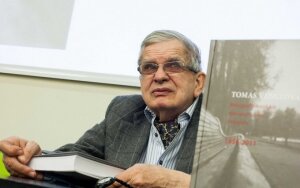- April 3, 2013
- 1069
Venclova became a honorary citizen of Vilnius

On Wednesday, Vilnius City Council decided to award a honorary citizenship of Vilnius to Tomas Venclova, a well-known Lithuanian poet, translator of literature and advocate of Polish-Lithuanian reconciliation.
In a special statement we read that „the city of Vilnius has the grounds and a full right to be proud of the fact that such a notable personage was raised here. Awarding Tomas Venclova a honorary citizenship acknowledges the relationship he had with his favourite city.”
35 years ago, a book entitled „Dialogue about Vilnius” written by both Czesław Miłosz and Tomas Venclova was published in Paris. Thanks to this publication the world found out about Vilnius and Polish-Lithuanian arguments.
Tomas Venclova became the 11th honorary citizen of Vilnius. We can also find president of the United States Ronal Reagan and Nobel prizewinner Czesław Miłosz amongst other honorary citizens of Vilnius.
Tomas Venclova, lithuanina poet, essayist, scholar and translator of literature, was born in Klaipeda in 1937. Since he was young, he was associated with Lithuanian and Russian anti-Communist opposition. He was a member of Lithuanian Movement for Defense of Human and Civic Rights in the 1970’s, he also worked for ‘the Chronicle of the Catholic Church in Lithuania’, among others.
He lived in Vilnius until 1977. Then, threaten with repressions he emmigrated to the USA. Because of that, he was deprived of Soviet citizenship by USSR. At first, as a visiting professor, he lectured at University of California in Berkeley. After moving to America, he became friends with Czesław Miłosz and Josif Brodski whom he met before. Venclova is associated with Polish culture and literature. Since 1983, he is a part of editorial staff of quarterly magazine ‘Literary Notebooks’ (Zeszyty Literackie). He also translated Polish poetry into Lithuanian.
Source: http://pl.delfi.lt/kultura/kultura/venclova-zostal-honorowym-obywatelem-wilna.d?id=61057903
Tłumaczenie Justyna Kaczmarek w ramach praktyk w Europejskiej Fundacji Praw Człowieka, www.efhr.eu. Translated by Justyna Kaczmarek within the framework of a traineeship programme of the European Foundation of Human Rights, www.efhr.eu.

